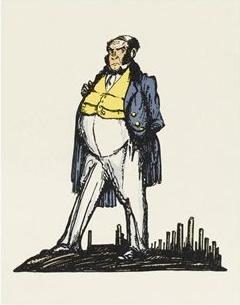Thursday
There was a lot to digest in Monday night’s debate between Hillary Clinton and Donald Trump, but one moment especially jumped out to me just because I could hear the voice of Charles Dickens in the background. It was Trump’s proposal to further lower taxes and regulations on American business—what Clinton described as trumped-up trickle-down economics.
First, here’s moderator Lester Holt’s question, followed by Trump’s response. Trump begins by promising that his proposals will lead to an explosion of growth and then (this is where he sounds like a Dickens capitalist) lamenting that American tax policy is driving business out of the country:
Holt: Secretary Clinton, you’re calling for a tax increase on the wealthiest Americans. I’d like you to further defend that. And, Mr. Trump, you’re calling for tax cuts for the wealthy. I’d like you to defend that. And this next two-minute answer goes to you, Mr. Trump.
Trump: Well, I’m really calling for major jobs, because the wealthy are going create tremendous jobs. They’re going to expand their companies. They’re going to do a tremendous job.
I’m getting rid of the carried interest provision. And if you really look, it’s not a tax — it’s really not a great thing for the wealthy. It’s a great thing for the middle class. It’s a great thing for companies to expand.
And when these people are going to put billions and billions of dollars into companies, and when they’re going to bring $2.5 trillion back from overseas, where they can’t bring the money back, because politicians like Secretary Clinton won’t allow them to bring the money back, because the taxes are so onerous, and the bureaucratic red tape, so what — is so bad.
So what they’re doing is they’re leaving our country, and they’re, believe it or not, leaving because taxes are too high and because some of them have lots of money outside of our country. And instead of bringing it back and putting the money to work, because they can’t work out a deal to — and everybody agrees it should be brought back.
Instead of that, they’re leaving our country to get their money, because they can’t bring their money back into our country, because of bureaucratic red tape, because they can’t get together. Because we have — we have a president that can’t sit them around a table and get them to approve something.
I posted the following passage from Hard Times (1854) in a past post about industries complaining about EPA air regulations, but it captures Trump’s whining as well. A sarcastic Dickens is amazed that industrialists manage to survive at all given how the deck is stacked against them:
The wonder was, [Coketown] was there at all. It had been ruined so often, that it was amazing how it had borne so many shocks. Surely there never was such fragile chinaware as that of which the millers of Coketown were made. Handle them never so lightly, and they fell to pieces with such ease that you might suspect them of having been flawed before. They were ruined, when they were required to send laboring children to school; they were ruined when inspectors were appointed to look into their works; they were ruined, when such inspectors considered it doubtful whether they were quite justified in chopping people up with their machinery; they were utterly undone, when it was hinted that perhaps they need not always make quite so much smoke.
And now business’s threatened retaliation, which sounds like a direct echo of Trump:
[One prevalent fiction] took the form of a threat. Whenever a Coketowner felt he was ill-used—that is to say, whenever he was not left entirely alone, and it was proposed to hold him accountable for the consequences of any of his acts—he was sure to come out with the awful menace, that he would “sooner pitch his property into the Atlantic.” This had terrified the Home Secretary within an inch of his life, on several occasions.
So should we conclude from this the companies that want to leave their native country are unpatriotic? Not at all:
However, the Coketowners were so patriotic after all, that they never had pitched their property into the Atlantic yet, but, on the contrary, had been kind enough to take mighty good care of it. So there it was, in the haze yonder; and it increased and multiplied.
So maybe we should call Trump’s bluff and follow Clinton’s suggestions, which is to raises taxes, especially on the top income earners, and plow the money into infrastructure repair, childcare and family leave programs, college debt reduction, and the like. I predict we will not see many businesses pitched into the sea.


